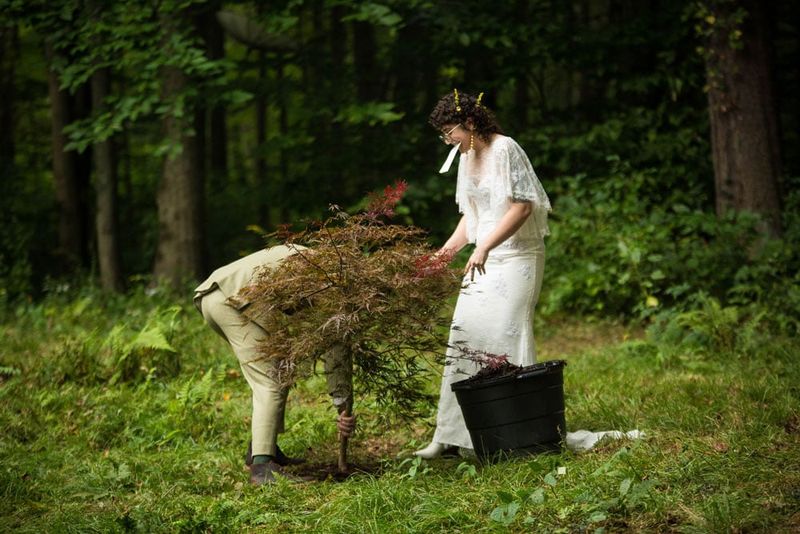The Art of Choosing Your Husband Every Day: 16 Simple Secrets to a Happy Marriage
Marriage isn’t one big, dramatic decision. It’s a million tiny ones. And one of the most powerful, underrated choices you can make — day after day — is to keep choosing him. Not in a fairy-tale, butterflies-every-morning kind of way, but in the real, imperfect, sometimes-exhausting, deeply human way that builds something strong and lasting.
The beauty of marriage lies in its everyday moments. Those small decisions to love, forgive, laugh, and grow together add up to something extraordinary over time. When you actively choose your husband—through good moods and bad, through exciting milestones and mundane Tuesdays—you’re creating a foundation that can weather any storm.
Here are 16 simple, quietly powerful secrets to a happy marriage—built around the art of choosing your husband, even (especially) when it’s not easy.
1. Plant a tree together every anniversary

Gardening alongside your spouse creates living landmarks of your journey together. My husband and I started this tradition on our first anniversary with a tiny maple sapling that now towers over our yard.
Each tree becomes a physical reminder of another year conquered together. During arguments, I sometimes walk out to our ‘anniversary grove’ to gain perspective. It’s hard to stay mad when confronted with literal growth.
The act of digging, planting, and nurturing mirrors marriage itself—messy at first, requiring patience, and eventually yielding something beautiful. Some years we chose fruit trees, creating harvests we now share with neighbors. Others we selected flowering varieties that bloom during tough seasons.
Our children have grown up climbing these trees, unaware they’re scaling the timeline of our love story. When we’re gone someday, these trees will remain—silent witnesses to a marriage that took root and flourished.
2. Write his name in the steam on the bathroom mirror

Steam messages are secret love notes that vanish almost as quickly as they appear. They cost nothing yet somehow feel more meaningful than expensive gifts. I started leaving them after our first big fight, when words felt too hard to say out loud.
My husband never mentioned seeing them until months later. ‘Those mirror messages get me through rough mornings,’ he confessed. Sometimes I draw silly faces, other times just his name with a heart.
The ephemeral quality makes them special—they exist only in that moment, like a whispered reminder: I see you, I chose you today. On particularly stressful weeks, I’ve come home to find he’s written my name back.
Marriage needs these tiny rituals that belong only to you two. The bathroom mirror has become our private communication channel, steamy love letters that require no response but somehow say everything we need to hear.
3. Memorize his coffee order by heart

Remember that scene in ‘When Harry Met Sally’ where he rattles off exactly how she likes her apple pie? That’s marriage gold. Knowing your husband takes his coffee with one sugar, a splash of cream, and only in that blue mug from your honeymoon isn’t just thoughtful—it’s a declaration.
The specifics matter more than the gesture. Last month, my husband had a terrible day at work. Without saying a word, I handed him his perfectly made coffee exactly how he likes it. ‘You’re the only person who knows me this well,’ he said, visibly relaxing.
These tiny details create an intimacy no passionate kiss can match. I’ve memorized a dozen seemingly insignificant preferences—how he folds his socks, which pillow he prefers, the exact temperature he likes the bedroom. He does the same for me.
It’s not about being a servant. It’s about paying such close attention that you become fluent in the language of his comfort.
4. Dance in the kitchen at midnight

‘We need to talk’ can kill a marriage. ‘Let’s dance’ can save it. Some of our best moments happen when I grab his hand while loading the dishwasher and pull him into a ridiculous twirl. No music necessary.
Kitchen dancing breaks tension like nothing else. Once, during a week-long cold war over finances, I caught him making a midnight sandwich. Instead of ignoring him, I silently took his hand. We swayed between refrigerator and stove for five minutes, and somehow the budget discussion the next day felt collaborative rather than combative.
Marriage needs physical connection that isn’t about sex. The playfulness of impromptu dancing reminds you both that before all the responsibilities, you simply enjoyed each other’s company. My husband used to have two left feet and a serious aversion to dancing. Now he initiates our kitchen waltz when he senses I’m overwhelmed.
No skill required—just willingness to be a little silly together.
5. Defend him fiercely to your mother

Family loyalty gets complicated after marriage. Your mom might make a seemingly innocent comment about his career choices or parenting style, and suddenly you’re facing a crossroads. Choose him. Every single time.
This doesn’t mean ignoring genuine concerns. But creating a protective bubble around your marriage means establishing boundaries with even the most well-meaning relatives. When my mother criticized how my husband handled our son’s tantrum, I surprised myself by firmly saying, ‘We’re a team, Mom. If you have concerns, share them with both of us or neither of us.’
The look of respect on my husband’s face was worth the momentary discomfort. Men often feel judged by their in-laws in ways women don’t fully understand. Your defense signals that your primary allegiance has properly shifted.
This extends to siblings, friends, and coworkers too. The rule is simple: criticize privately, praise publicly. Your loyalty creates a foundation of trust that makes him feel secure enough to be vulnerable with you.
6. Learn to fix something he usually handles

Marriage roles often develop without discussion. He handles the car maintenance; you manage the social calendar. Surprising him by learning one of ‘his’ tasks creates a special kind of appreciation. Last summer, I secretly watched YouTube tutorials on fixing our temperamental lawn mower.
When it died mid-mow while he was traveling for work, I didn’t call for help. Instead, I fixed it myself and casually mentioned it when he called that night. His reaction wasn’t just gratitude but a new respect. ‘You didn’t have to do that,’ he said, genuinely moved.
This isn’t about proving independence. It’s about showing you value his contributions enough to understand them. I’ve since learned basic car maintenance, how to restart our finicky water heater, and the mysteries of our circuit breaker box.
The effort communicates: I see the invisible work you do. I don’t take it for granted. We’re truly partners here. That message resonates far deeper than any anniversary card could.
7. Create a secret language only you two understand

Private jokes and code words forge an intimate world only you two inhabit. My husband and I say ‘purple elephant’ when we need to escape a boring social event. One whispered mention and the other creates an excuse to leave within fifteen minutes—no questions asked.
‘Marshmallow situation’ means one of us is feeling emotionally fragile and needs gentler treatment. These phrases evolve naturally from shared experiences. After watching a terrible movie with an absurd catchphrase, that line became our signal for ‘I’m annoyed but not seriously mad.’
During a recent family holiday when tensions were rising, my husband caught my eye across the room and mouthed our code word for ‘remember when we got lost in Vermont?’ Instantly, I was transported to that rainy adventure where everything went wrong but we laughed anyway. My irritation dissolved.
Your secret language creates a bubble of privacy even in crowded rooms. It reminds you both: we have a world that belongs only to us, accessible anytime with just a word.
8. Throw away the bathroom scale if he’s struggling with his body image

Women aren’t the only ones with body insecurities. Men just hide it better. When my husband started checking the mirror more often and making self-deprecating jokes about his ‘dad bod,’ I noticed the bathroom scale had become his morning ritual—followed by a notably darker mood.
Without comment, I removed the scale completely. When he asked where it went, I simply said, ‘I love your body exactly as it is. That thing was making us both feel bad.’ He looked relieved.
Marriage means protecting each other from unnecessary pain, even self-inflicted kinds. Instead of focusing on weight, we started taking evening walks together—not for fitness but for conversation and hand-holding. His confidence gradually returned.
This applies to anything that triggers insecurity. Maybe it’s balding, career setbacks, or aging parents. Creating a judgment-free zone where he doesn’t have to perform or measure up isn’t coddling—it’s creating sanctuary. Home should be the one place he never has to suck in his stomach or pretend to be more than he is.
9. Buy ridiculous socks for no reason at all

Marriage needs whimsy to survive. Those matching Christmas pajamas are cute, but random Tuesday surprises matter more. I started buying my husband outrageous socks on ordinary days—flamingos one week, tacos the next. The sillier, the better.
His initial confusion (‘It’s not my birthday?’) turned to delight. Now he wears them to important meetings under serious suits. ‘My secret weapon,’ he calls them. These tiny surprises inject lightness into routine days.
The psychological effect runs deeper than you’d think. Small, unexpected gifts communicate: I think about you even when I don’t have to. I notice what makes you smile. I choose you not just on special occasions but during mundane errands.
He’s started reciprocating with equally ridiculous gifts—miniature dinosaurs left in my car, a tiny potted cactus wearing googly eyes. These token exchanges have nothing to do with romance in the traditional sense, yet they’ve become our love language. Marriage thrives on this kind of purposeful silliness—it’s the antidote to taking life too seriously.
10. Learn to snowboard together at age 40

Shared humiliation creates powerful bonds. When both of you are equally terrible at something new, a special kind of intimacy develops. At 39, my husband mentioned always wanting to try snowboarding. Instead of the expected ‘you’re too old’ response, I booked lessons for both of us.
We fell constantly. Bruised in places we didn’t know could bruise. But we laughed more that weekend than we had in months. Being beginners together stripped away years of established roles and expectations.
Learning new skills as adults is vulnerable. When your spouse sees you struggle without judgment—and you do the same for them—something profound happens. We now have a yearly ‘New Skill February’ tradition. We’ve tried pottery (disaster), ballroom dancing (surprising success), and paddleboarding (still debating who was worse).
These shared challenges create fresh conversation, inside jokes, and mutual admiration. Marriage easily falls into efficient routines where you each stick to what you’re good at. Breaking that pattern by being gloriously bad at something together reignites appreciation for each other’s courage.
11. Keep a jar of his favorite candy hidden in your nightstand

Sometimes marriage needs secret weapons. The peanut butter cups stashed in my nightstand drawer have salvaged more tense evenings than any communication technique. When discussions turn circular or tempers flare, I simply reach into the drawer and wordlessly offer his favorite candy.
The unexpected sweetness creates a pattern interrupt. The gesture says, ‘Yes, we’re disagreeing, but I still know what brings you joy.’ It’s nearly impossible to maintain righteous anger while chewing chocolate.
This isn’t about avoiding conflict through distraction. It’s about remembering the person behind the issue. The candy jar has become our relationship reset button. Sometimes he’ll pause mid-sentence during a disagreement, open my drawer, and help himself—a signal he recognizes we need to lighten up.
The specific treat matters less than the thoughtfulness behind it. Your husband’s equivalent might be hot sauce, protein bars, or fancy tea. What matters is having tangible evidence that you pay attention to his preferences, even in the midst of discord.
12. Randomly declare ‘Burger Tuesday’ on a Thursday

Predictability kills passion faster than anything. Breaking routine on purpose signals you’re still capable of spontaneity. Last month, I texted my husband mid-afternoon: ‘It’s Burger Tuesday!’ He replied, confused: ‘It’s Thursday?’ My response: ‘Not anymore!’
That evening, we abandoned our meal plan and grocery list. Instead, we tried a new burger joint across town, ate with our hands, and had a surprisingly deep conversation about our bucket lists. The arbitrary ‘holiday’ freed us from our responsible parent personas for a few hours.
Marriage easily becomes a business partnership focused on logistics and child-rearing. Creating fake celebrations disrupts that pattern. We now regularly declare random days to be official observances: Milkshake Monday (on a Saturday), Breakfast-for-Dinner Day, Go The Long Way Home Day.
The specific activity matters less than the shared conspiracy of breaking rules together. These tiny rebellions against your own routine remind you both: we make the rules in our marriage. We can change them anytime we want.
13. Apologize in haiku form only

Arguments happen in every marriage. Finding unique ways to break the tension afterward prevents resentment from building. After a particularly stupid fight about loading the dishwasher, I slipped a note under his office door: ‘Dishes cause anger / I spoke without thinking first / Please forgive my words.’
He laughed out loud, tension broken. The ridiculous formality of counting syllables while apologizing makes it impossible to stay mad. The haiku requirement also forces careful word choice—you can’t ramble or make excuses when limited to seventeen syllables.
Since then, we’ve maintained this tradition for minor disagreements. The silliness of the format prevents apologies from becoming melodramatic or routine. Plus, it requires thought and effort, showing you’re truly investing in making things right.
Sometimes his haikus are terrible—intentionally so—which only adds to their charm. ‘Forgot anniversary / Bought chocolate and flowers late / Please don’t kill me now.’ The laughter that follows these poetic attempts at reconciliation heals more effectively than formal apologies ever could.
14. Become the official photographer of his weird hobby

Men often have passions their wives politely tolerate rather than celebrate. My husband restores vintage radios—a hobby I initially found baffling. Instead of merely enduring his endless talk about vacuum tubes, I appointed myself his official photographer.
I created an Instagram account documenting his restorations. His niche community discovered it, and suddenly his ‘weird hobby’ connected him with enthusiasts worldwide. The pride on his face when showing me comments from fellow collectors was worth every minute spent photographing disassembled electronics.
Your husband’s passion might be brewing beer, building model trains, or competitive barbecuing. The specific interest matters less than your willingness to validate it. By documenting his process, you’re saying: This matters because it matters to you.
The unexpected benefit? I’ve learned enough about vintage electronics to ask meaningful questions. What began as a supportive gesture evolved into genuine shared interest. Not all hobbies will captivate both partners, but actively championing what brings him joy—rather than competing with it—strengthens your bond immeasurably.
15. Leave the last bite of dessert for him without mentioning it

Small sacrifices speak volumes when they happen without announcement or expectation of praise. I always leave the last bite of dessert for my husband—not with a martyr’s sigh or pointed glance seeking acknowledgment, but quietly, as if it’s the most natural thing in the world.
He noticed this pattern years ago. ‘You always leave me the last bite,’ he said, genuinely touched. Now he does the same for me. This silent exchange has become one of our most meaningful rituals.
Marriage thrives on these microscopic generosities. The last cookie. The bigger portion of steak. The comfier spot on the couch. When offered without fanfare or scorekeeping, these tiny sacrifices create a culture of mutual consideration.
The key is consistency without complaint. The moment you point out your generosity (‘I gave you the last piece!’), its value diminishes. True generosity happens when no one’s watching, with no expectation of reciprocation. Yet ironically, these small selfless acts are usually the ones partners notice most—and the ones they’re most likely to mirror back to you.
16. Create fake movie reviews of your actual day together

Ordinary days need extraordinary framing. After particularly mundane Saturdays—grocery shopping, lawn mowing, laundry folding—I sometimes turn to my husband and deliver a dramatic movie critic review of our day. ‘Critics are calling their trip to Home Depot ‘riveting’ and ‘a masterclass in washer selection!”
He’s learned to play along, adding his own ridiculous commentary. ‘The tension during the frozen food aisle scene was palpable!’ This silly game transforms routine errands into adventures worth recounting.
Marriage can feel cinematically uninteresting compared to the highlight reels we see on social media. By playfully elevating ordinary moments through exaggerated narration, we remind ourselves that a good life isn’t about constant excitement—it’s about finding meaning in mundane moments together.
Sometimes we pretend we’re characters in different film genres: our tax preparation becomes a high-stakes thriller; assembling IKEA furniture transforms into an emotional drama about perseverance. This shared imagination exercise requires zero planning but creates lasting inside jokes. The best marriages create their own entertainment rather than passively consuming it.







